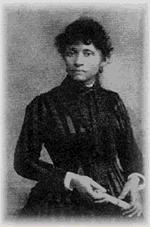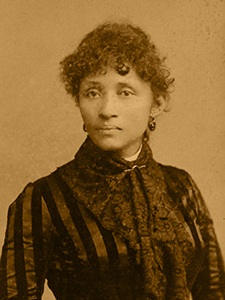

 Lucy Parsons was a respected writer and powerful orator known throughout the United States and around the world. Many of her writings appeared in the Alarm, a revolutionary syndicalist newspaper edited by her husband, Albert, and founded by the International Working People's Association (IWPA), of which Lucy was a member. She also published articles in The Demonstrator, where she wrote about social justice and labor rights; in Freedom, where she scorned lynchings, and for the Liberator, of which she was the editor. In 1886, she published The Famous Speeches of the Eight Chicago Anarchists in Court. In 1887, she released Albert Parsons's book Anarchism: Its Philosophy and Scientific Basis (which he penned in prison while awaiting execution). And in 1889, she published The Life of Albert Parsons, dedicated to exposing the state's crime of killing her husband and their comrades for their political beliefs. Although she frequently wrote for various publications, Lucy Parsons was most widely known for her inspiring and moving speeches, which enthralled the masses and sparked panic in authority nationwide.
Lucy Parsons was a respected writer and powerful orator known throughout the United States and around the world. Many of her writings appeared in the Alarm, a revolutionary syndicalist newspaper edited by her husband, Albert, and founded by the International Working People's Association (IWPA), of which Lucy was a member. She also published articles in The Demonstrator, where she wrote about social justice and labor rights; in Freedom, where she scorned lynchings, and for the Liberator, of which she was the editor. In 1886, she published The Famous Speeches of the Eight Chicago Anarchists in Court. In 1887, she released Albert Parsons's book Anarchism: Its Philosophy and Scientific Basis (which he penned in prison while awaiting execution). And in 1889, she published The Life of Albert Parsons, dedicated to exposing the state's crime of killing her husband and their comrades for their political beliefs. Although she frequently wrote for various publications, Lucy Parsons was most widely known for her inspiring and moving speeches, which enthralled the masses and sparked panic in authority nationwide.
Carolyn Ashbaugh described Lucy's voice as "musical". Her speeches "captivated the audience... No one moved, scarcely remembering to breathe". But the authorities feared her. After a speech in Chicago, the police charged Lucy with "inciting to riot" and threw her in jail. Later, she was temporarily barred from speaking in Chicago at all, a clear violation of her first amendment rights, and she was often refused entry to scheduled speaking engagements by local authorities. Parsons was arrested many times over the years for simply speaking publicly or handing out literature. "Her fiery rhetoric alarmed newspaper reporters and editors as well as local police chiefs," writes Jacqueline Jones. "They called her a 'firebrand' and charged her with making 'incendiary' statements calculated to 'ignite' the discontent of the laboring classes and engulf the country in a violent 'conflagration.' Newspaper headlines labelled her the 'goddess of anarchy.'" When Parsons spoke, she inspired thousands of workers to organize in solidarity and rise up in militant action. Lucy spent very little time writing or talking about herself and her personal life. Parsons believed it was the causes she championed, the movements she supported, and the struggles against injustice for oppressed people that were of paramount importance, and saw little purpose in publicizing her own life. "For Lucy Parsons," writes Roxanne Dunbar-Ortiz, "identity—other than being of and for the working class—was irrelevant." As a result we are left with minimal autobiographical resources concerning the life of Lucy Parsons. The vast array of writings, speeches and other accounts of Lucy Parsons are also few and far between. Much of her writings, her personal journals, letters and other history burned with Lucy when her house caught fire and ended her life in 1942. The remaining letters, writings and other documents of Lucy Parsons (along with her collection of 3,000 books) were promptly confiscated and eliminated by the authorities, who considered her words too dangerous and likely to inspire future generations. Because of this, we are left with very few of her writings and lectures, but what remains is insightful. One of her most controversial articles, "To Tramps", was published in 1884 in the Alarm, where she made a dramatic appeal to destitute and unemployed workers who had lost their will to live. Essentially, she encouraged anyone who wanted to commit suicide to find a rich person and end their life too. "Learn the use of explosives!", she proclaimed. A year later in 1885, she exclaimed "Let every dirty, lousy, tramp arm himself with a revolver or knife and lay in wait on the steps of the palace of the rich and stab or shoot the owners as they come out." Anarchists of the era referred to such tactics as Propaganda by the Deed (attentat); a forceful act against an oppressor with the intention of sparking the masses into revolutionary foment. Many dissidents of the era were convinced a revolution was imminent, but for many laborers, it was a call to self-defense. This was a time in which police engaged in violent confrontations with striking workers, and private security companies, such as the Pinkertons, were hired to break up unions by force. "There is a set of men nay, beasts for you! Pinkerton detectives! They would do anything", exclaimed Lucy Parsons. The Pinkertons were present at the Haymarket bombings in 1886, and testified at the trial that sentenced Albert Parsons to death. During the Great Railroad Strike of 1877 (which was pivotal in radicalizing Lucy's politics), over 100,000 workers battled with police, military and undercover Pinkertons, which left over 100 people dead. And in 1892, the Pinkertons engaged in a 12-hour gun battle with striking Homestead workers, killing 16 men and wounding 23 others. "From the Great Railroad Strike of 1877 onward," writes Jacqueline Jones (in her book Goddess of Anarchy), "the Parsonses and other anarchists and socialists wrote and spoke often about the need for the laboring classes to defend themselves against armed authorities: when the police, or militia, or federal troops used force to break up peaceful assemblies, the masses must respond in kind." For Lucy Parsons and many labor activists of her time, class war was a battle to be fought by any means necessary. The most comprehensive printed collection of Lucy Parsons's writings and speeches can be found in the book Lucy Parsons: Freedom, Equality & Solidarity, Writings and Speeches, 1878-1937, edited by Gale Ahrens (published in 2004).
Writings & Lectures By Lucy Parsons: To Tramps: The Unemployed, the Disinherited, and Miserable A Wise Move: On Anarchist Organization An Interview with Lucy Parsons on the Prospects for Anarchism in America The Voice of the People will yet be Heard Speeches at the Founding Convention of the Industrial Workers of the World The IWW and the Shorter Workday Industrial Workers of the World: Aims and Objects Are Class Interests Identical? I'll be Damned if I go Back to Work Under Those Conditions!: A May Day Speech Industrial Evolution & Labor Day: The AFL versus the IWW The Eleventh of November, 1887 Woman: Her Evolutionary Development Famous Women of History: Louise Michel Property Rights vs. Human Rights Books Published by Lucy Parsons: The Famous Speeches of the Eight Chicago Anarchists in Court Foreword to The Life of Albert Parsons Preface to Anarchism: Its Philosophy and Scientific Basis Anarchism: Its Philosophy and Scientific Basis by Albert Parsons Other Resources: Lucy Parsons: Freedom, Equality & Solidarity, Writings and Speeches, 1878-1937 by Gale Ahrens Goddess of Anarchy: The Life and Times of Lucy Parsons, American Radical by Jacqueline Jones Lucy Parsons: An American Revolutionary by Carolyn Ashbaugh The Pinkertons Have a Long, Dark History of Targeting Workers by Kim Kelly |